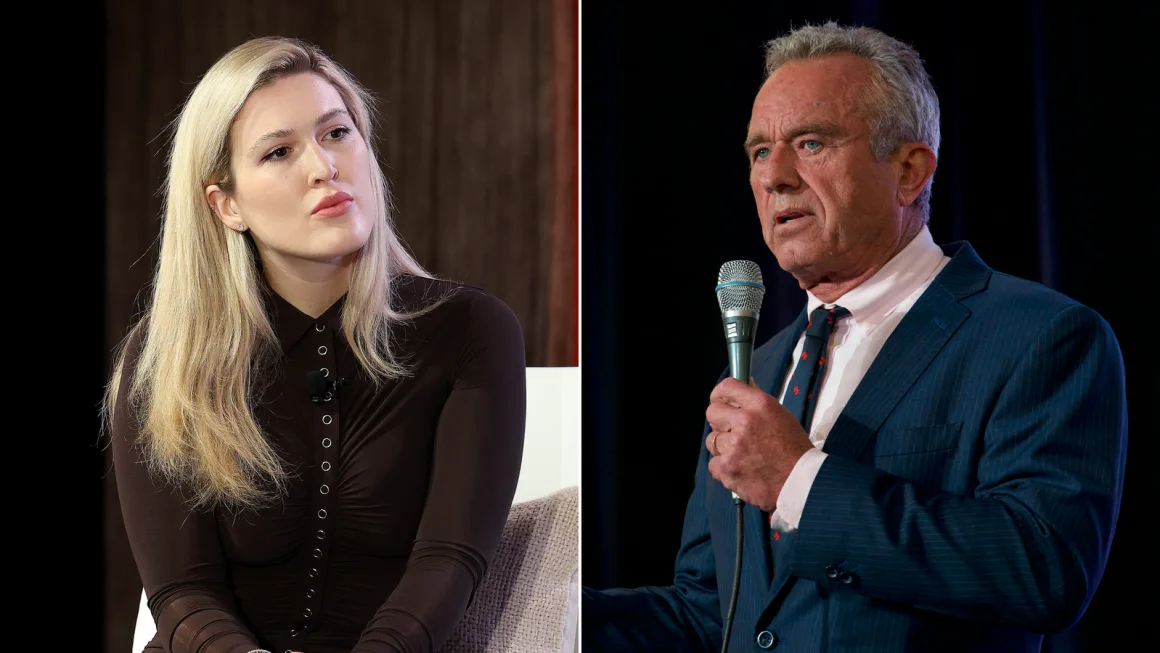Olivia Nuzzi, one of America’s most well-known political journalists, has been placed on leave by New York Magazine after disclosing a personal relationship with a subject she once covered. The magazine has initiated a third-party review to assess the situation. This news has sparked a discussion about journalistic ethics, transparency, and potential conflicts of interest.
While the magazine has not publicly named the individual involved, a report by CNN claims that the subject of the relationship was Robert F. Kennedy Jr. Kennedy, a former independent presidential candidate, has also endorsed Donald Trump. According to a person familiar with the situation, the relationship was emotional and took place digitally, with no physical aspect involved. This raises questions about the boundaries between personal interactions and professional responsibilities.
Kennedy’s spokesperson has denied any significant connection with Nuzzi, stating that he only met her once during an interview, which reportedly led to a negative article. However, the claim of a personal connection adds complexity to the story, especially given the heightened scrutiny surrounding the 2024 campaign.
Nuzzi’s Statement and Apology

In response to the situation, Nuzzi issued a statement to CNN, acknowledging that the relationship did, at some point, become personal. She expressed regret over her failure to disclose the interaction to her editors at New York Magazine.
“Earlier this year, some communication between myself and a former reporting subject turned personal. During that time, I did not report on the subject nor use them as a source,” she said. Nuzzi emphasized that while the relationship was never physical, it should have been disclosed to avoid the appearance of a conflict of interest.
She apologized to her colleagues and readers for the oversight, expressing disappointment for not addressing the matter sooner. Nuzzi’s admission that she failed to act swiftly in disclosing the relationship has fueled ongoing debate regarding the ethical responsibilities journalists have when it comes to transparency and impartiality.
New York Magazine’s Response
In a statement to readers, New York Magazine confirmed that Nuzzi is currently on leave while an external review takes place. The publication emphasized that Nuzzi’s actions violated the magazine’s strict policies around conflicts of interest and proper disclosure. If the relationship had been made known earlier, Nuzzi would not have been allowed to continue reporting on the 2024 presidential campaign, according to the statement.
The magazine also noted that, despite this violation, an internal review of Nuzzi’s previous articles found no evidence of bias or inaccuracies. Still, the publication expressed regret for what it described as a breach of trust with its readers. Transparency and trust are key pillars in journalism, and the magazine’s response underlines the importance of upholding those values.
Impact on Nuzzi’s Career
Olivia Nuzzi has built a reputation as one of the most insightful and hard-hitting political journalists in the United States. She has written numerous in-depth profiles of high-profile figures, including former President Donald Trump and several prominent politicians involved in the 2024 campaign. This incident marks a difficult moment in her career, as the personal and professional lines have blurred in ways that can compromise trust.
For journalists, maintaining clear boundaries between personal relationships and professional duties is vital. The audience must trust that reporting is unbiased and free from any potential personal influence. This situation serves as a reminder of the challenges and pressures journalists face, especially when covering politically sensitive topics.
Ethical Considerations in Journalism
The situation with Nuzzi brings up broader questions about ethics in journalism. In an era where public trust in the media is more critical than ever, transparency is a non-negotiable standard. Journalists are expected to disclose any potential conflicts of interest to their editors or employers. Failing to do so can lead to the perception that reporting may be compromised, even if no bias is present.
Media organizations must ensure that their journalists adhere to clear ethical guidelines, particularly when covering sensitive topics like political campaigns. These standards are not only there to protect the integrity of the journalist but also to maintain public trust. Any breach of those ethical standards can erode that trust and have long-lasting consequences for both the journalist and the publication.
Moving Forward
As the third-party review proceeds, both New York Magazine and Olivia Nuzzi will likely face further scrutiny. It remains to be seen what the long-term implications of this situation will be for Nuzzi’s career and for the magazine itself. However, this incident underscores the ongoing importance of transparency, accountability, and ethical conduct in journalism.
While the future of Olivia Nuzzi with New York Magazine is uncertain, the magazine’s swift response reflects a commitment to upholding its editorial standards. As the review continues, this situation serves as a reminder to all journalists of the critical need for clear boundaries between personal and professional life, especially when reporting on complex political matters.
The decision to place Olivia Nuzzi on leave raises questions about the fine line between personal relationships and professional ethics in journalism. While no bias was found in her work, the failure to disclose a personal connection with a reporting subject has cast a shadow over her journalistic integrity.
New York Magazine has taken the necessary steps to address the situation, but this incident will undoubtedly prompt further discussions about ethical guidelines in political reporting. For now, the magazine and its readers await the findings of the third-party review.





